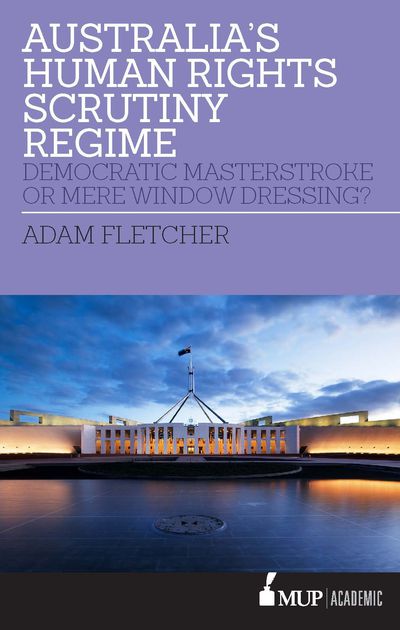Australia’s Human Rights Scrutiny Regime
Democratic Masterstroke or Mere Window Dressing?
Adam Fletcher
Ebook
Out of stock
$31.99
$31.99
$31.99
$31.99
$31.99
$31.99
$31.99
$31.99
$31.99
$31.99
$31.99
Member discount
As an MUP member you get 40% off the RRP of all print books.
Member discount
As an MUP member you get 40% off the RRP of all print books.
Member discount
As an MUP member you get 100% off the RRP of all print books.
Member discount
As an MUP member you get 25% off the RRP of all print books.
Member discount
As an MUP member you get 25% off the RRP of all print books.
Member discount
As an MUP member you get 25% off the RRP of all print books.
Member discount
As an MUP member you get 40% off the RRP of all print books.
Member discount
As an MUP member you get 10% off the RRP of all print books.
Member discount
As an MUP member you get 35% off the RRP of all print books.
Member discount
As an MUP member you get 40% off the RRP of all print books.
Australia’s Human Rights Scrutiny Regime
Democratic Masterstroke or Mere Window Dressing?
Adam Fletcher
In 2010 the Australian Government decided that it would not propose a Human Rights Act, despite the relevant recommendation of the 2008-09 National Human Rights Consultation. Instead, it introduced a Human Rights Framework comprising several measures to enhance human rights protection, including theHuman Rights (Parliamentary Scrutiny) Act 2011. The scrutiny regime under that Act was designed to ensure rights would be given due consideration before Commonwealth legislation was passed.
The Act created a unique 'bipartite dialogue' system, involving a formal interchange on rights compatibility between the executive and Parliament, while excluding the courts. This set the Commonwealth apart from jurisdictions such as the ACT, Victoria, New Zealand and the UK, which have statutory rights instruments administered by their courts.
The book presents a detailed study of all aspects of the scrutiny regime, and compares the regime with its closest counterparts overseas. In assessing the regime's impact, it argues…
The Act created a unique 'bipartite dialogue' system, involving a formal interchange on rights compatibility between the executive and Parliament, while excluding the courts. This set the Commonwealth apart from jurisdictions such as the ACT, Victoria, New Zealand and the UK, which have statutory rights instruments administered by their courts.
The book presents a detailed study of all aspects of the scrutiny regime, and compares the regime with its closest counterparts overseas. In assessing the regime's impact, it argues…
In 2010 the Australian Government decided that it would not propose a Human Rights Act, despite the relevant recommendation of the 2008-09 National Human Rights Consultation. Instead, it introduced a Human Rights Framework comprising several measures to enhance human rights protection, including theHuman Rights (Parliamentary Scrutiny) Act 2011. The scrutiny regime under that Act was designed to ensure rights would be given due consideration before Commonwealth legislation was passed.
The Act created a unique 'bipartite dialogue' system, involving a formal interchange on rights compatibility between the executive and Parliament, while excluding the courts. This set the Commonwealth apart from jurisdictions such as the ACT, Victoria, New Zealand and the UK, which have statutory rights instruments administered by their courts.
The book presents a detailed study of all aspects of the scrutiny regime, and compares the regime with its closest counterparts overseas. In assessing the regime's impact, it argues that a system in which the executive and Parliament are responsible both for protecting rights and for remedying rights breaches is neither more legitimate nor more effective than one involving all three branches of government. Accordingly, it calls for strengthening reforms.
The Act created a unique 'bipartite dialogue' system, involving a formal interchange on rights compatibility between the executive and Parliament, while excluding the courts. This set the Commonwealth apart from jurisdictions such as the ACT, Victoria, New Zealand and the UK, which have statutory rights instruments administered by their courts.
The book presents a detailed study of all aspects of the scrutiny regime, and compares the regime with its closest counterparts overseas. In assessing the regime's impact, it argues that a system in which the executive and Parliament are responsible both for protecting rights and for remedying rights breaches is neither more legitimate nor more effective than one involving all three branches of government. Accordingly, it calls for strengthening reforms.
Ebook
Out of stock
$31.99
$31.99
$31.99
$31.99
$31.99
$31.99
$31.99
$31.99
$31.99
$31.99
$31.99
Member discount
As an MUP member you get 40% off the RRP of all print books.
Member discount
As an MUP member you get 40% off the RRP of all print books.
Member discount
As an MUP member you get 100% off the RRP of all print books.
Member discount
As an MUP member you get 25% off the RRP of all print books.
Member discount
As an MUP member you get 25% off the RRP of all print books.
Member discount
As an MUP member you get 25% off the RRP of all print books.
Member discount
As an MUP member you get 40% off the RRP of all print books.
Member discount
As an MUP member you get 10% off the RRP of all print books.
Member discount
As an MUP member you get 35% off the RRP of all print books.
Member discount
As an MUP member you get 40% off the RRP of all print books.








